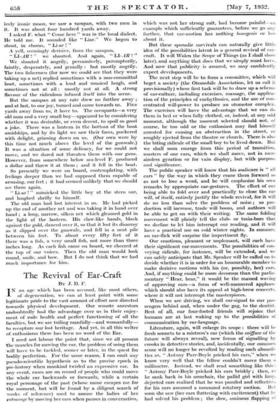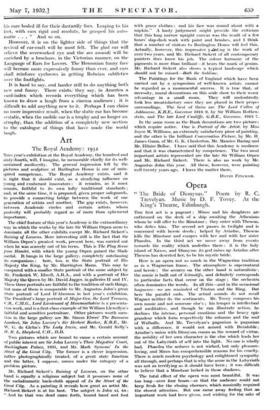The Revival of Ear-Craft
By J. D. F.
IN an age which has been accused, like most others, of degeneration, we can at least point with some legitimate pride to the vast amount of effort now directed towards physical development. Our remote ancestors undoubtedly had the advantage over us in their enjoy- ment of rude health and perfect functioning of all the faculties, but we are toiling manfidly—and womanfully- to recapture our lost heritage. And yet, in all this welter
of enthusiasm there has been no word of the Ear. .
I need not labour the point that, since we all possess The muscles for moving the ear, the problem of using them will have to be tackled, sooner or later, in the quest for bodily perfection. For the same reason, I can omit any pseudo-scientilic hypothesis as to the precise epoch in pm-history when mankind twirled an expressive ear. In any event, cases are on record of people who could move the whole car backwards or forwards, while a certain royal personage of the past (whose name escapes me for the moment, but will be found by a diligent search of works of reference) used to amuse the ladies of her entourage by moving her ears when pauses in conversation,
which was not her strong suit, had become painful—an example which sufficiently guarantees, before we go any further, that ear-motion has nothing bourgeois or low about it.
But these sporadic survivals can naturally give little idea of the possibilities latent in a general revival of car-
craft. It will Widen the Scope of Things (as I shall show later), and anything that does that we simply must have. And now that publicity is assured, we may confidently expect developments.
The next step will be to form a committee, which will beget a society (the Otomobile Association, let us call it
provisionally) whose first task will be to draw up a scheme of ear-culture, including exercises, massage, the applica- tion of the principles of eurhythmics, and the use of con- centrated will-power to produce an otomotor complex. The exercises will have the advantage that we can do them in bed or when fully clothed, or, indeed, at any odd moment, although the moment selected should not, of course, be too odd or the enthusiast may find himself arrested for causing an obstruction in the street, or roughly ejected from the theatre or church. There is also the biting ridicule of the small boy to be lived down. But we shall soon emerge from this period of transition, masters of our cars, which we shall move, not in mere aimless gyration or for vain display, but with purpose and significance.
The public speaker will know that his audience is " all ears " by the way in which they crane them forward so as not to lose a word, and he will emphasize his own remarks by appropriate ear-gestures. The effect of our being able to fokl over and practically to close the ear will, of itself, entirely justify the whole revival, for it will do no less than solve the problem of noise ; so pro- duction will increase, trade will boom, and authors will be able to get on with their writing. The same folding movement will plainly tell the club- or train-bore that we decline to let him interrupt our reading, and it will have a practical use on cold winter nights. In summer, an ear-Rick will surprise the impertinent fly.
Our emotions, pleasant or unpleasant, will each have their significant ear-movements. The possibilities of con- veying ridicule, for instance, will be extended, and we can safely anticipate that Mr. Speaker will be called on to decide whether it is in order for an honourable member to make derisive motions with his (or, possibly, her) cars. And, if anything could be more decorous than the parlia- mentary " Hear, hear," it would be the massed waving of approving ears—a form of well-mannered applause -which should also have its appeal at high-brow concerts, where it will not interrupt the masterpieces.
When we are driving, we shall car-signal to our pas- sengers behind and, when under the gag, to the dentist. Best of all, our four-footed friends will rejoice that humans are at last waking up to the possibilities of communication by car-language.
Literature, again, will enlarge its scope : them will be fresh sonnets to a mistress's car (which the coiffure of the future will always reveal), new forms of signalling by crooks in detective stories, and, incidentally, our common sense will no longer be revolted by reading such absurdi- ties as, " Antony Parr-Boyle pricked his ears," when we know very well that the fellow couldn't move them a millimetre. Instead, we shall read something like this " Antony Parr-Boyle pricked his ears briskly ; then, as he sank back in his armchair, the pallid girl with limp, dejected ears realized that he was puzzled and reflective, for his ears assumed a measured rotatory motion. Bet soon she saw (her ears fluttering with excitement) that he had solved his problem ; the slow, ominous flapping of
his cars boded ill for their dastardly foes. Leaping to his feet, with ears rigid and resolute, he grasped his auto- matic . . . " And so on.
However, it is on the lighter side of things that the revival of ear-craft will be most felt. The glad ear will relieve the overworked eye and the ars amandi will be enriched by a brochure, in the 'Victorian manner, on the Language of Ears for Lovers. The Ilensonian funny face will become more expressively funny than ever, and ears shall reinforce eyebrows in getting Robciau subtleties over the footlights.
It is hard to say, and harder still to do anything both new and funny. There exists,' they say, in America a card-index which records everything which has been known to draw a laugh from a cinema audience ; it is difficult to add anything new to it. Perhaps I can claim no more impressive result, when the static ear has become ecstatic, when the mobile ear is a trophy and no longer an atrophy,. than the addition of a completely new section to the catalogue of things that have made the world laugh.







































 Previous page
Previous page